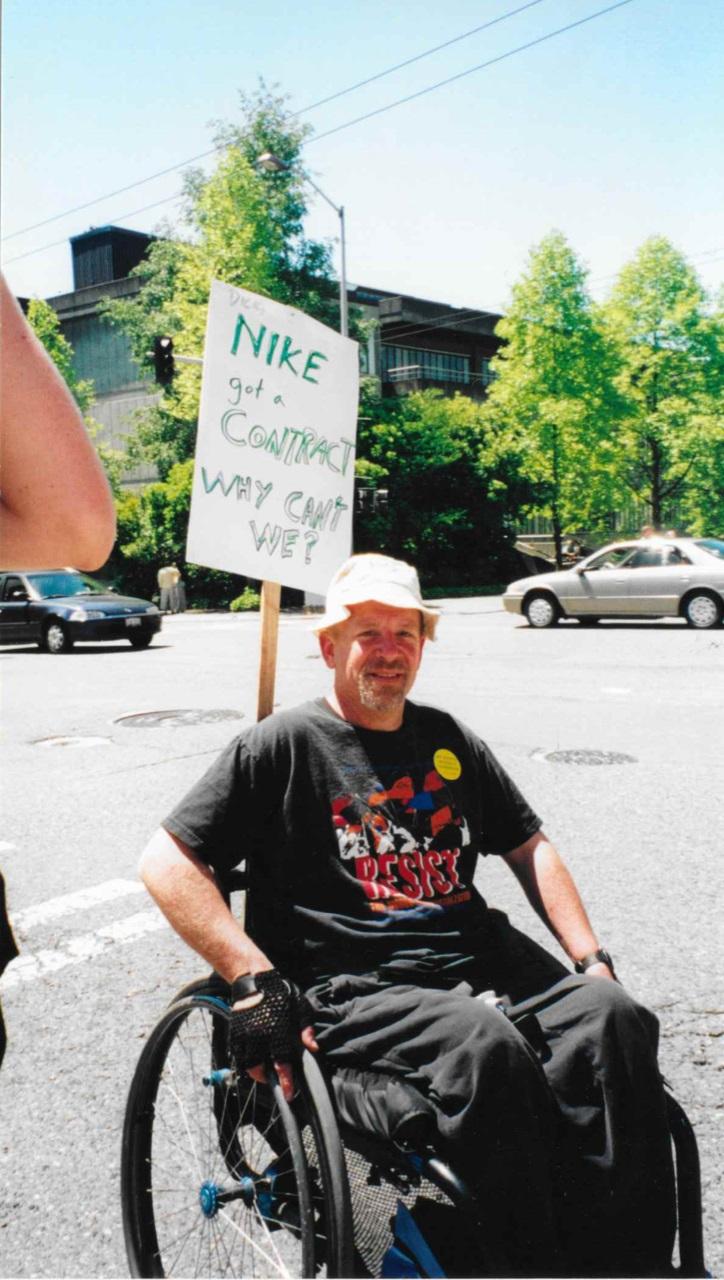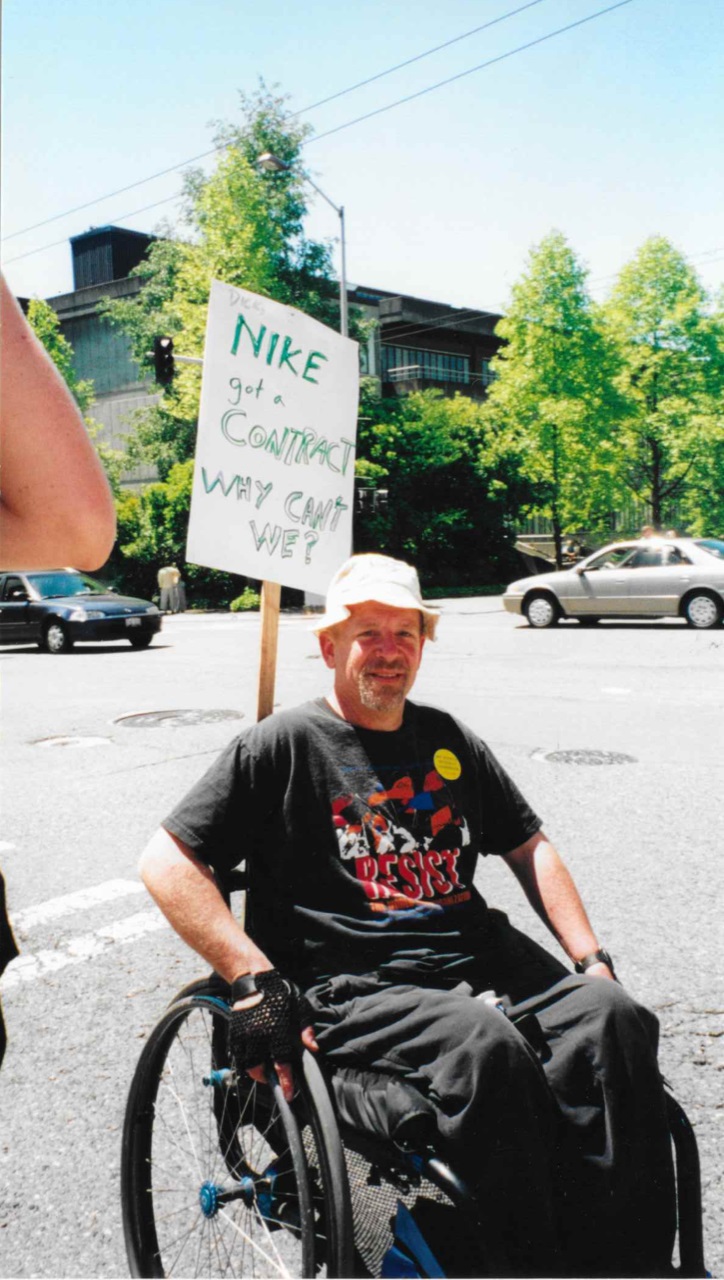In Memory of Steve Marquardt, Labor Activist and Historian

With great sadness we learned that Steve Marquardt passed away on Friday, July 5th. Steve was a distinguished labor researcher and activist who played a foundational role as the first graduate student assistant to the Harry Bridges Chair and the Center for Labor Studies. Charles Bergquist, a former Bridges Chair and Steve's academic advisor at the University of Washington, wrote the following tribute, emphasizing Steve's accomplishments as a labor historian and his contributions to the Bridges Center during its formative years.
A TRIBUTE TO STEVE MARQUARDT
By Charles Bergquist, Professor Emeritus of History at the University of Washington, Harry Bridges Chair in Labor Studies (1994-1996)

On May 27, 2019 I received a disconcerting e-mail from Steve Marquardt, a friend and former student in the History Department at the University of Washington. Sent to a group of friends and close associates, the e-mail announced that Steve and his doctors had agreed that they had run out of options to treat or even slow down the chronic infection in his spine. “It will kill me,” Steve wrote, “though whether it will take weeks or months is impossible to predict.” He said he had enrolled in Hospice.
He went on to say that, although he was sad, he had expected this outcome for so long “that it comes as almost a relief to finally be here.” He urged his friends to give all their support to his wife, Julie, and his daughter Rosie, and asked them to “please go register voters, donate to progressives, or march in the street for me.” “One of my biggest regrets,” he concluded, “is that I am out of the fight.”
* * * * * * * * * * * * * * * * * *
Marquardt enrolled in the University of Washington History Department in 1990 at the relatively advanced age of 35 intending to work toward a PhD in Modern Latin American history. He had previously attended Claremont Men’s College, where he studied for three years beginning in 1972, and served as student body president before his scholarship was revoked by an administration disgusted with his politics and his criticism of the policies of the institution. Years later, in 1988, he graduated with a BA from Evergreen State University.
Most of the intervening years he spent in the woods doing contract work for the U.S. Forest Service, mainly through a worker-owned and managed cooperative, fighting fires, planting trees, serving as a fire lookout, and harvesting evergreen cones for replanting. It was during these years that he traveled to Central America for the first time, focusing on solidarity with the Sandinista Revolution in Nicaragua. In 1987, while harvesting cones in northeast Washington, he suffered a catastrophic accident, falling from a tree and crushing his lower spine. The accident left him paralyzed from the waist down, a condition he suffered from up to his passing. Following his recovery and depending now on a wheelchair to get around, he reentered college and soon after married Julie Creahan, an employee at the Seattle Art Museum in charge of collection care. Then, after graduating from Evergreen, he applied to do graduate work at the UW.
Once enrolled at the UW Steve proved to be a brilliant student and an effective activist. He excelled in his coursework on Latin America. He served on committees that made the campus much more accessible to people with disabilities. He was a founding member of the labor union representing graduate academic employees, GSAC (now UAW 4121).
Perhaps his greatest legacy at the UW was his service as the inaugural graduate assistant for the Harry Bridges Chair and Center for Labor Studies. Established in 1992 and named for the legendary founder and longtime president of the union of Pacific Coast longshore workers, the ILWU, the Bridges Chair and Labor Center were initially funded primarily by the small donations of hundreds of rank and file workers, mainly from the ILWU. The Chair and Center were housed in the departments of History and Political Science following a university-wide competition of units vying to host them. In his capacity as graduate student assistant at the Bridges Center, Steve played a foundational role in the formation of what would become one of the most successful interdisciplinary programs on campus. Along with faculty associated with the Center in the two departments, Steve helped decide how the Bridges Chair would be filled, how the two departments would govern the Center, and what the initial and long-term priorities of the Center would be. His greatest contribution in this regard was to prioritize the sending of UW undergraduates out to work with participating unions across the region as interns and researchers, an initiative that not only helped the undergraduates and unions involved but broadened the appeal of the Center to local unions beyond the ILWU.
For his dissertation, Steve decided to study the history of labor in the Central American banana industry with a primary focus on Costa Rica. Field research in a foreign country always presents special challenges but the obstacles Steve encountered doing research even in relatively developed Costa Rica were formidable. He once told me that during his first research trip there in 1992 he would have to climb on all fours onto municipal buses whose floors were streaked with baby urine and melted popsicles and crawl up the stairs at the national archive dragging his wheelchair behind him. (Things were much better when he returned to Costa Rica for another year of research in 1996. By then the archive was housed in a new building with good access for those with disabilities.) These year-long research trips were possible because he won a prestigious pre-dissertation grant from the Social Science Research Council in 1992 and joint dissertation grants from the SSRC and the Fulbright program in 1996.
By the late 1990s Steve began to suffer from chronic infections in his lower spine which could only be controlled by periodic operations and massive doses of antibiotics. These health conditions slowed his progress in completing his dissertation and he eventually decided to turn what he had written into two fine articles, both of which were published in major journals and both of which were awarded prizes, the first by the American Historical Association, the second by the Latin American Studies Association.[1] Richly documented and effectively written these articles fused labor and environmental concerns into a powerful new perspective on the history of the Central American banana industry. By extension, the articles offered labor and environmental historians a new and innovative template for work in those fields more generally.
About the time he published these articles Steve faced a momentous decision. He decided to leave academic life and accept an exciting invitation from the AFL-CIO to serve as a researcher in an ambitious effort to organize airport workers across the country. That was the beginning of an illustrious activist career as a union researcher working with unions servicing farmworkers, coal miners, construction workers and grocery and healthcare workers, among others. Steve only retired from doing this work in 2017.
Steve once asked me if I was disappointed as his academic advisor that he hadn’t finished his dissertation. Although I believe that had he done so he would have landed a job at a major university and had a successful career as a labor and environmental historian, I answered “No.” Steve produced innovative labor scholarship, left enduring progressive institutional legacies from his time at the UW, and did more to actively promote social justice than any academic I’ve known. It is an honor to pay tribute to his remarkable career.
[1] Steve Marquardt, “‘Green Havoc’: Panama Disease, Environmental Change, and Labor Process in the Central American Banana Industry,” American Historical Review, Vol. 106 (1) (Feb. 2001): 49-80; Steve Marquardt, “Pesticides, Parakeets, and Unions in the Costa Rican Banana Industry, 1938-1962,” Latin American Research Review, Vol. 37 (2) (Spring 2002): 3-36.